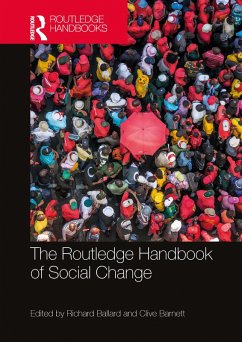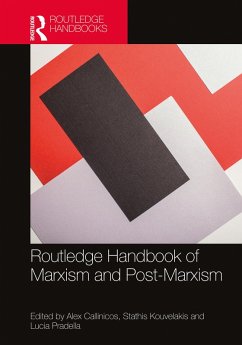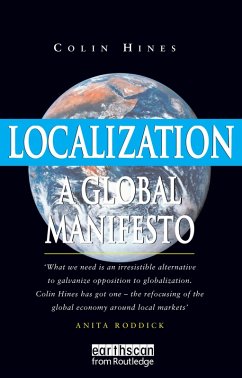
The Routledge Handbook of Social Change (eBook, ePUB)
Versandkostenfrei!
Sofort per Download lieferbar
44,95 €
inkl. MwSt.
Weitere Ausgaben:

PAYBACK Punkte
22 °P sammeln!
The Routledge Handbook of Social Change provides an interdisciplinary primer to the intellectual approaches that hold the key to understanding the complexity of social change in the twenty-first century.We live in a world of intense social transformation, economic uncertainty, cultural innovations, and political turmoil. Established understandings of issues of well-being, development, democratisation, progress, and sustainability are being rethought both in academic scholarship and through everyday practice, organisation and mobilisation. The contributors to this handbook provide state-of-the-...
The Routledge Handbook of Social Change provides an interdisciplinary primer to the intellectual approaches that hold the key to understanding the complexity of social change in the twenty-first century.
We live in a world of intense social transformation, economic uncertainty, cultural innovations, and political turmoil. Established understandings of issues of well-being, development, democratisation, progress, and sustainability are being rethought both in academic scholarship and through everyday practice, organisation and mobilisation. The contributors to this handbook provide state-of-the-art introductions to current thinking on central conceptual and methodological approaches to the analysis of the transformations shaping economies, polities, and societies. Topics covered include social movements, NGOs, the changing nature of the state, environmental politics, human rights, anti-globalism, pandemic emergencies, post-Brexit politics, the politics of resilience, new technologies, and the proliferation of progressive and reactionary forms of identity politics.
Drawing on disciplines including anthropology, human geography, political sociology, and development studies, this is a comprehensive and authoritative introduction to researching key issues raised by the challenge of making sense of the twenty-first century futures.
We live in a world of intense social transformation, economic uncertainty, cultural innovations, and political turmoil. Established understandings of issues of well-being, development, democratisation, progress, and sustainability are being rethought both in academic scholarship and through everyday practice, organisation and mobilisation. The contributors to this handbook provide state-of-the-art introductions to current thinking on central conceptual and methodological approaches to the analysis of the transformations shaping economies, polities, and societies. Topics covered include social movements, NGOs, the changing nature of the state, environmental politics, human rights, anti-globalism, pandemic emergencies, post-Brexit politics, the politics of resilience, new technologies, and the proliferation of progressive and reactionary forms of identity politics.
Drawing on disciplines including anthropology, human geography, political sociology, and development studies, this is a comprehensive and authoritative introduction to researching key issues raised by the challenge of making sense of the twenty-first century futures.
Dieser Download kann aus rechtlichen Gründen nur mit Rechnungsadresse in A, B, BG, CY, CZ, D, DK, EW, E, FIN, F, GR, HR, H, IRL, I, LT, L, LR, M, NL, PL, P, R, S, SLO, SK ausgeliefert werden.













